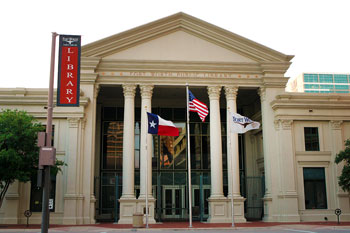Pedro Herrera is sitting at a table at the Fort Worth Library’s Northside branch on a Saturday afternoon with three little kids. They aren’t his; he is helping out a friend whose budget and work schedule make it tough to pay for summer child care. So the 63-year-old retired construction worker takes the kids to the library three or four times a week.
Shirley, 9, is reading while her brother Carlos, 7, plays with Lincoln Logs and little sister Emily, 4, quietly stacks dominoes. “I love to read,” Shirley said.
Herrera is reading too, a magazine devoted to hot rods. “I think libraries are more important than ever before,” he said. “People are working more hours for less money. They can’t afford books and movies, and the library is a good place for kids to learn and explore. Cities need to invest in their future, and community libraries like this are very important right now. They need to expand the system and not do cutbacks of service.”
 So many folks agree with him that when city officials proposed closing three branch libraries two years ago to help deal with a serious budget shortfall, city hall was met with an avalanche of criticism. Now two consulting companies have come to the conclusion that the city library system, even with those branches left intact, is woefully inadequate for a city of this size and that Fort Worth needs to spend more than $50 million in the next decade to bring the system up to speed.
So many folks agree with him that when city officials proposed closing three branch libraries two years ago to help deal with a serious budget shortfall, city hall was met with an avalanche of criticism. Now two consulting companies have come to the conclusion that the city library system, even with those branches left intact, is woefully inadequate for a city of this size and that Fort Worth needs to spend more than $50 million in the next decade to bring the system up to speed.
For library supporters, the conclusions are welcome and not surprising. But the disconnect could set taxpayers’ heads spinning. Why build more libraries when the existing ones are woefully short on books and most are still closed a couple of days a week? Residents can ask those questions and others at a series of public meetings over the next month. The consultants’ plan will eventually be considered for approval by the library board and then the city council.
Fort Worth Library Director Gleniece Robinson said the proposal to close the branches two years ago and the long-term plan are unrelated. “In the budget process two years ago, each city department was asked to cut 15 percent of their budget,” she said. “But the long-term planning over 10 to 15 years gives the city the options to deal with population growth and delivery of services as the city changes.”
She acknowledged that “the community was outraged over the branch closings, they let council know about it, and we found other ways to cut our expenses through [cutting back library hours] and the use of more volunteers.”
The two city-ordered studies, paid for with library funds and a state grant, cost about $290,000. Buxton Company Inc., of Fort Worth, examined how customers use the library, and Godfrey’s Associates of Rhode Island studied facilities usage.
A major conclusion: Fort Worth libraries, like those around the country, are busier than ever, despite changes wrought by the digital age.
“Twenty-first century libraries are no longer the book warehouses of old,” the researchers wrote. “They are vibrant centers of the community, in touch with residents, providing myriad ways to help them improve their quality of life.”
Although library use is growing here, the consultants found that Fort Worth ranked near the bottom in many categories of library use compared to cities of similar size, such as Denver. Only 26 percent of Fort Worth residents have library cards, for instance, about half the average in eight cities used as comparisons.
That could be related to what is (or isn’t) available to check out and whether libraries are open when people can get to them. Most Fort Worth branches are open in the evening only once or twice a week. And according to the study, Fort Worth in 2009 spent less than half as much, per capita, on new materials compared to the other cities — $3.35 compared to the average of $7.63 in the other cities.
What did the consultants recommend to improve the quality of the library collections? The study didn’t cover that. Robinson said that question will be addressed next, based on factors like changes in technology and budget issues.
Overall budget numbers reflect the same lack of emphasis on libraries here as the other statistics in the report. The Fort Worth Library’s annual budget this year is $17.8 million ($25 per capita) compared to $45.5 million average for the other cities ($62 per capita).
Fort Worth devotes about a third less floor space to libraries than the other cities averaged. One factor involved: Nine of the current 16 branches here were built in the 1960s.
Robinson said the plan involves adjusting services to fit the differing demographics of users at the branches. “Some will focus more on digital, some more on job training programs, some more on children’s materials,” she said.
If all the proposed projects are approved and completed, the city would increase its number of branches from 16 to 22, with some housed in leased space or in already-existing buildings to be purchased. A large new branch library would be located in the fast-growing far north Fort Worth area, with smaller branches near the intersection of Camp Bowie Boulevard and Montgomery Street and in the Las Vegas Trail/Camp Bowie Boulevard West area.
The Northside branch would be closed in 2016 and combined with the Diamond Hill/Jarvis branch in a new or leased space on North Main Street. The current Wedgwood branch would be closed around the same time and relocated to a larger facility two miles south in the vicinity of McCart Avenue and Sycamore School Road.
Total budget for capital improvements in the new plan is $52.7 million, which could come from future bond elections and corporate donations.
Robinson said operating costs overall aren’t expected to go up much from the current levels, due to several factors: Some branches will be remodeled to lower energy costs, and staffing levels would likely be reduced, partly through the use of automated checkout machines.
The consultants also recommend a major overhaul of the downtown library, where, they noted, about a fourth of the space is vacant. The plan calls for services to be moved from the basement to the first-floor plaza level and library offices to be moved to cheaper space in downtown buildings. The library’s upper floor would be used for computer and job training programs and for meeting rooms that could be leased to outside groups.
The consultants also suggest that space be leased out for a café and maybe even a small grocery store.
“I’d use a café in the library if they had one,” said Linda Clyma, who had brought her two young daughters to the downtown library on a recent Saturday afternoon. The girls were playing computer games in the children’s section. Clyma said she checks out about 10 books and four movies for them each week.
“There is a lot of empty space [in the downtown library], and I think if [the library staff] was more creative, they could offer more materials and services,” she said.
A look around revealed many bookshelves completely empty and others far from full. About half the video material on the shelves was on cassette tape rather than DVDs. Few magazines and newspapers were available.
Clyma echoed the consultants’ conclusion that more Cowtown residents would use the library system if the products were better. “The children’s offerings are pretty good, no problem with that,” she said. “But the books for adults are very old and outdated. And they probably could use more computer terminals.
“Libraries are very important for the information they provide, but they are also very important in a social way for a city,” she said. “It is a place where people from all walks of life get exposed to each other in some ways, and this city is very often too segregated by class and ethnicity. That is … an important reason to invest in libraries.”










